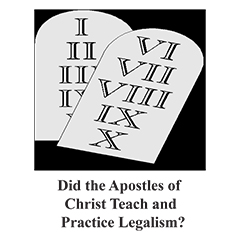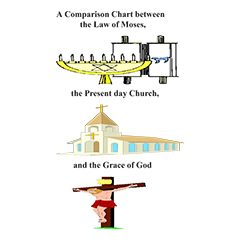Booklet Categories
Our Booklets
Would you like to send our FREE booklets to a prisoner that you may know.
Please send us a Request, we’ll add them to our monthly mailing list.
Visitors:
Should A Christian Major In Minors?

Index
- Are Little Things Important in the life of a Christian?
- Giant Steps or a Little at a Time?
- Am I Changing My Self or is God Making me New in Christ?
- How Does God Increase The Christian?
1. Are Little Things Important In The Life Of A Christian?
When we hear or read the Word of God do we need to ask if everything God has said is important, or do I discard what is not important to me? Is everything that God has said the spirit of truth or is some of it the spirit of error? (1 John 4:6). When Jesus was speaking to Satan as recorded in Matthew 4:4, Jesus said that man shall not live by bread alone but by every word that came out of the mouth of God. Jesus said when praying to the Father “Sanctify them by Your truth. Your word is truth” (John 17:17). We could assume by these statements that the small or inconvenient things of Scripture are also included.
In Scripture we find numerous ex.amples that show the importance of small things. For instance, the woman with the two mites recorded in Mark 12:42. Two “mites” may be worth only 2 to 16 cents, a very small sum. However, the Lord praised her more for giving the two mites, than those who gave large sums of money. In Mat.thew 14:15-21, we are told about a boy with two fish and five loaves of bread. Even so, this insignificant small amount of food fed five thousand men plus women and children.
2 Kings 4:1-7 relates the story of Elisha and a woman with only one small pot of oil. Yet in following Elisha’s instructions to borrow every pot she could find, this small amount of oil was increased to fill every pot she could borrow. It was only a little pot of oil, but faith in the prophet’s words changed her destitute, hopeless predicament into much wealth.
In John 13:8 it is shown to us that Peter did not want Jesus to wash his feet be.cause he did not see any value in this act. Jesus said: “If I do not wash you, you have no part with Me.” Only a small foot wash, but the difference between whether Peter would have part (fellowship) with Jesus or not. We too are like Peter if we use our own heart, family, friends or church for our standard of the revelation of God rather than Scripture. These are only a few ex.amples of the magnitude of our God work.ing through small things.
The tendency today in the churches is for people to believe the teachings of men rather than the clear instruction in Scrip.ture. It is an evil heart that judges the Word of God to be unimportant even in small things. Our God is looking to His people for faith in small things. The story in Luke 16:1-13 teaches us that anyone who is not faithful in small things will not be faithful in large things either, as in verse 10. This is a solemn thing, to reject even the smallest things of God.
“And the sons of the prophets said to Elisha. See now, the place where we dwell with you is too small for us” (2 Kings 6:1). The typology here is that the place where the man of God dwelt was too small or confining. This is what many church people think today. That is; that the truths revealed in Scripture are too small to be important. Just as the sons of the prophets, who wanted to build somewhere else, so also do many today, to escape the narrow path of the Word of God. Many people in churches today want to build their life some.where where they are not restricted by the Holy Spirit and Scripture. In Revelation 3:8 it is revealed to us that the assembly in Philadelphia had little strength, but they had not denied the name of Jesus. Exercising little strength in believing the Word of Christ is commended by the Lord Jesus. Phila.delphia and Smyrna were the only two churches of the seven, which the Lord Jesus does not rebuke. These churches may have been small and unimportant. But both churches valued the word of Jesus, how.ever small or unimportant it was in man’s eyes.
The Christian’s calling is to be faithful to the Word of God, not judging His Word, but responding to what would seem to many to be small or insignificant. Multi.tudes of people in churches seem to re.spond, yet find fault with the inconvenient things of Christ. The apostle calls atten.tion to the Hebrews for their problem of being dull of hearing (Hebrews 5:11-14). This condition of dull hearing in professed believers comes about by not receiving in faith the whole counsel of God. Spiritual sluggishness is the end result as seen in Hebrews 5:11; 6:12.
In Numbers 24:5, Balaam prophesied these words “How lovely are your tents, O Jacob! Your dwellings, O Israel!” What Balaam was speaking about was that the favor of God was resting upon Israel.
The same favor of God rests on the Christian who will believe God (John 15:9.10). Abraham is an example of a man who believed God. God had told Abraham to go to mount Moriah to worship by sacri.ficing his son (Genesis 22:1-2, 5). Abra.ham no doubt found it most distasteful to sacrifice his son. However, he believed God, who had the power to raise Isaac up again from the dead (Hebrews 11:17-19).
The idea that man should judge God is found both in the world and in churches equally today. The seed of the Word of God will find no deep soil in the heart of any person who feels at liberty to judge the importance or value of the Word of God (Matthew 13:8).
When Job was dealing with great troubles, he also judged the importance of God’s Word (Job 19:6). However, in Job’s words of repentance he said this: “I have uttered what I did not understand, things too wonderful for me, which I did not know” (Job 42:3). Job stopped judging God’s Word and action as God confronted him. Job then put his finger on the real problem and said this in verse six: “There.fore I abhor myself, and repent in dust and ashes” (Job 42:6). In other words, whether it is Job or us it is not the smallness of God’s Word, but the smallness of our own heart that keeps us from believing God.
2. Giant Steps Or A Little At A Time?
“For we are God’s fellow workers; you are God’s field, you are God’s building” (1 Corinthians 3:9).
If we were to construct a building and build it exactly the way the designer in.tended it to be constructed, it would be necessary to pay attention to every detail. Starting with the foundation up, everything would need to be put into the construction that the plans call for, for the finished build.ing to come out as designed. No concrete, nails, boards, windows or roof shingles could be left out. If anything were left out it would be an unfinished product or in.complete. The smallest nail or the largest beam equally have their place to make the building complete. The building would not only be incomplete but there would be a deficiency in the building if any nail or beam were left out.
A Christian is a building under con.struction. The Holy Spirit and Scriptures are forming this building; the Christian is a co-worker with God in the construction. The Christian’s part is to believe God, even in the smallest detail. God’s part is to work through the believer’s faith to make a new creation in the image of His Son (Romans 8:29; Ephesians 4:13). Even the smallest Scripture must have its place in the pro.cess of making us new. We become re.newed in our minds as the Holy Spirit re.veals to us the truths of Christ. However, the things of God which are not received in faith, cannot be used in our building process.
Martin Luther said, “We become what we believe.” Unbelief even in the smallest truths takes away from the building materi.als that God is using to form us into the image of Christ. This is why Jesus said to the seven churches, “He that has an ear let him hear what the Spirit says to the churches” (Revelation 2:7, 11, 17, 29; 3:6, 13, 22). “For without faith it is impossible to please God” (Hebrews 11:6).
3. Am I Changing Myself Or Is God Making Me New In Christ?
“Unless the Lord builds the house, they labor in vain who build it” (Psalms 127:1).
“Or do you not know that your body is the temple of the Holy Spirit who is in you, whom you have from God, and you are not your own?” (1 Corinthians 6:19 JND).
Which house has ever built itself? Or which house has ever picked its own build.ing materials with which to build itself? None, of course. But in Christendom to.day that is precisely what is being at.tempted. Because every Christian is God’s building, therefore, God is the master builder, not the Christian. The Christian part is to willingly receive the materials with which God is using to build. The Holy Spirit uses all of Scripture, both small and great, to build what God has designed. When the Christian for whatever reason starts self- selecting Scripture, the Holy Spirit is quenched. The Holy Spirit then cannot use all of the building materials that are provided in Scripture. All of Scripture are the building materials God uses to con.form the believer into the image of His Son (2 Timothy 3:16).
“But God has chosen the foolish things of the world to put to shame the wise, and God has chosen the weak things of the world to put to shame the things which are mighty” (1 Corinthians 1:27).
This Scripture needs little explanation. What the natural man or religious man views as unimportant, God uses for great changes in people of faith. But the natu.ral man or religious man does not place value on God’s ways. He is more con.tent with his own ways or the religious body with which he is connected.
For the Christian who is walking in faith, this is not enough. He must possess the whole counsel of God to know the mind of Christ (Acts 20:27; 1 Corinthians 2:16).
Without the whole counsel of God, we will have an incomplete understanding of our position in Christ and the direction that the truths of Christ will lead us. Fur.thermore the bondage of our own ways will still be with us.
4. How Does God Increase the Christian?
“But we urge you, brethren, that you increase more and more” (1 Thessalonians 4:10).
A Christian is exhorted in this Scrip.ture to be increased in the things of Christ. Since we have nothing in our selves to bring this about, it is something that only God can bring about in the believer (Phil.ippians 2:13). Our part in the develop.ment of Christ in us is to believe God. Jesus made this clear to Thomas when He said to him, “Be not faithless, but believ.ing” (John 20:27). This is God’s method of increasing spiritual growth in the be.liever. This does not mean that we should believe God for what we think or want to believe. The responsibility of a Christian is to believe God in what He teaches us by His Spirit and in Scripture. 2 Peter 1:3-10 shows us the building of God in process. This list starts with faith, then continues with the virtues that develop for growth in Christ to take place. Peter tells us that we will never fail if we allow these things to take place within us (2 Peter 1:10). If we believe God according to His truth these virtues will be automatic. If we give lip service to them while our heart is pursuing something else we consider more worthy of our time, then these virtues will not take place. Looking at others rather than at Christ leads away from the faith.
“For we dare not class ourselves or compare ourselves with some who com.mend themselves; but these measuring themselves by themselves and comparing themselves with themselves, are not intelli.gent” (2 Corinthians 10:12 JND). Many believe what their church, pastor, teacher or even what their own heart tells them. However, only the truth taught in Scripture and made real to us by the Holy Spirit, will have any lasting value to transform us into the image of the Son of God. The things that man considers small are as important as the large things to bring this transforma.tion about. For instance, one very small verse by a little known prophet, put forth these words, “But the just shall live by his faith” (Habakkuk 2:4 JND).
The whole New Testament doctrine of receiving the grace of God through faith is founded on that one small verse. A very small obscure Scripture but the whole world has been changed by it in the last 500 years. If Martin Luther and the other reformers had felt that to believe God though this Scripture was too small to worry about, the western world would still be under the yoke of Romanism.
The question before every Christian is should we major in minors? Does God intend for every Christian to listen to the Spirit’s still small voice? Had Elijah not listened to the small still voice he would not have heard the voice of the Lord (1 Kings 19:12-13). Elijah was a prophet of God, so also is every Christian, and like Elijah who prophesied, a Christian is to also prophesy (1 Corinthians 14:1-5). Elijah saw the wind, the earthquake, the rocks broken before his eyes, the earthquake and a fire. The Lord was not in any of them (1 Kings 19:11-12).
The Christian hears of many signs and wonders today that are said by many to be of God. However, it is in the small still voice that the Christian is told to follow, the Lord Jesus. “My sheep hear My Voice, and I know them, and they follow Me” (John 10:27). To hear the voice of Jesus, a Christian must major in what men consider a minor thing. The voice of Jesus can be heard only in the full counsel of God, as found in the Word of God.
D. Neely
August 2000
revised 3-27-2006
“For as many as are led by the Spirit of God, these are sons of God” (Romans 8:14).
Jesus Your words emit fullness of Your might
In which saints find hope, pureness, and light
Beauty of God realized in sound of Your voice
Your wooing lures the sheep of Your choice Your’s are words of truth, and word’s of life
At Your whisperings the soul ceases of strife
D.N.


























































